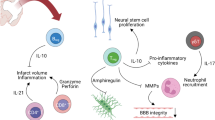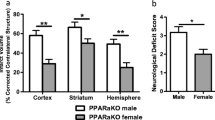Abstract
We recently reported that diabetes negates the cerebrovascular protection typically seen in adult female rats resulting in cognitive impairment, which is worsened by increased parenchymal bleeding and edema after ischemic stroke. Although women experience more severe diabetes and suffer from a higher rate of diabetic complications, including stroke and cognitive impairment, underlying mechanisms contributing to sex differences are limited. Emerging evidence suggests interleukin (IL)-17 contributes to cerebrovascular pathologies: (1) high salt diet-mediated expansion of IL-17-producing T cells (Th17) in the gut microbiome promotes cerebrovascular dysfunction and cognitive impairment in male mice, (2) increased IL-17-producing γδTCR cells exacerbates stroke injury in male mice, and (3) IL-17 promotes rupture of cerebral aneurysms in female mice. Based on these premises, we investigated the potential involvement of IL-17-producing inflammatory cells in cerebrovascular dysfunction and post-stroke vascular injury in diabetes by measuring intestinal, circulating, or cerebral T cell profiles as well as in plasma IL-17 in both sexes. Cell suspensions prepared from naive or stroked (3 days after stroke) diabetic and control rats were analyzed by flow cytometry, and IL-17 levels were measured in plasma using ELISA. Diabetes deferentially promoted the expansion of cerebral Th17 cells in females. In response to stroke, diabetes had a sexually dimorphic effect on the expansion of numerous T cell profiles. These results suggest that a better understanding of the role of IL-17-producing cells in diabetes may identify potential avenues in which the molecular mechanisms contributing to these sex differences can be further elucidated.




Similar content being viewed by others
References
Abdul, Y., Abdelsaid, M., Li, W., Webb, R. C., Sullivan, J. C., Dong, G., et al. (2018). Inhibition of toll-like receptor-4 (TLR-4) improves neurobehavioral outcomes after acute ischemic stroke in diabetic rats: Possible role of vascular endothelial TLR-4. Molecular Neurobiology. https://doi.org/10.1007/s12035-018-1184-8.
Arnetz, L., Ekberg, N. R., & Alvarsson, M. (2014). Sex differences in type 2 diabetes: Focus on disease course and outcomes. Diabetes, Metabolic Syndrome and Obesity,7, 409–420. https://doi.org/10.2147/DMSO.S51301.
Barrett-Connor, E. (1997). Sex differences in coronary heart disease. Why are women so superior? The 1995 Ancel keys lecture. Circulation,95(1), 252–264.
Benakis, C., Brea, D., Caballero, S., Faraco, G., Moore, J., Murphy, M., et al. (2016). Commensal microbiota affects ischemic stroke outcome by regulating intestinal gammadelta T cells. Nature Medicine,22(5), 516–523. https://doi.org/10.1038/nm.4068.
Bertoni, A. G., Krop, J. S., Anderson, G. F., & Brancati, F. L. (2002). Diabetes-related morbidity and mortality in a national sample of U.S. elders. Diabetes Care,25(3), 471–475.
Braun, M., Vaibhav, K., Saad, N., Fatima, S., Brann, D. W., Vender, J. R., et al. (2017). Activation of myeloid TLR4 mediates T lymphocyte polarization after traumatic brain injury. The Journal of Immunology,198(9), 3615–3626. https://doi.org/10.4049/jimmunol.1601948.
Bushnell, C. D., Reeves, M. J., Zhao, X., Pan, W., Prvu-Bettger, J., Zimmer, L., et al. (2014). Sex differences in quality of life after ischemic stroke. Neurology,82(11), 922–931. https://doi.org/10.1212/WNL.0000000000000208.
Carr, M. C. (2003). The emergence of the metabolic syndrome with menopause. Journal of Clinical Endocrinology and Metabolism,88(6), 2404–2411. https://doi.org/10.1210/jc.2003-030242.
Chalouhi, N., Points, L., Pierce, G. L., Ballas, Z., Jabbour, P., & Hasan, D. (2013). Localized increase of chemokines in the lumen of human cerebral aneurysms. Stroke,44(9), 2594–2597. https://doi.org/10.1161/STROKEAHA.113.002361.
Faraco, G., Brea, D., Garcia-Bonilla, L., Wang, G., Racchumi, G., Chang, H., et al. (2018). Dietary salt promotes neurovascular and cognitive dysfunction through a gut-initiated TH17 response. Nature Neuroscience,21(2), 240–249. https://doi.org/10.1038/s41593-017-0059-z.
Flores-Gomez, A. A., de Jesus Gomez-Villalobos, M., & Flores, G. (2019). Consequences of diabetes mellitus on neuronal connectivity in limbic regions. Synapse,73(3), e22082. https://doi.org/10.1002/syn.22082.
Gall, S. L., Donnan, G., Dewey, H. M., Macdonell, R., Sturm, J., Gilligan, A., et al. (2010). Sex differences in presentation, severity, and management of stroke in a population-based study. Neurology,74(12), 975–981. https://doi.org/10.1212/WNL.0b013e3181d5a48f.
Gall, S. L., Tran, P. L., Martin, K., Blizzard, L., & Srikanth, V. (2012). Sex differences in long-term outcomes after stroke: Functional outcomes, handicap, and quality of life. Stroke,43(7), 1982–1987. https://doi.org/10.1161/STROKEAHA.111.632547.
Gelderblom, M., Weymar, A., Bernreuther, C., Velden, J., Arunachalam, P., Steinbach, K., et al. (2012). Neutralization of the IL-17 axis diminishes neutrophil invasion and protects from ischemic stroke. Blood,120(18), 3793–3802. https://doi.org/10.1182/blood-2012-02-412726.
Hafez, S., Abdelsaid, M., El-Shafey, S., Johnson, M. H., Fagan, S. C., & Ergul, A. (2016). Matrix metalloprotease 3 exacerbates hemorrhagic transformation and worsens functional outcomes in hyperglycemic stroke. Stroke,47(3), 843–851. https://doi.org/10.1161/STROKEAHA.115.011258.
Hoh, B. L., Rojas, K., Lin, L., Fazal, H. Z., Hourani, S., Nowicki, K. W., et al. (2018). Estrogen deficiency promotes cerebral aneurysm rupture by upregulation of Th17 cells and interleukin-17A which downregulates E-cadherin. Journal of the American Heart Association. https://doi.org/10.1161/jaha.118.008863.
Holley, M. M., & Kielian, T. (2012). Th1 and Th17 cells regulate innate immune responses and bacterial clearance during central nervous system infection. The Journal of Immunology,188(3), 1360–1370. https://doi.org/10.4049/jimmunol.1101660.
Janghorbani, M., Hedley, A. J., Jones, R. B., Zhianpour, M., & Gilmour, W. H. (1993). Gender differential in all-cause and cardiovascular disease mortality. International Journal of Epidemiology,22(6), 1056–1063.
Kelly-Cobbs, A. I., Prakash, R., Coucha, M., Knight, R. A., Li, W., Ogbi, S. N., et al. (2012). Cerebral myogenic reactivity and blood flow in type 2 diabetic rats: role of peroxynitrite in hypoxia-mediated loss of myogenic tone. Journal of Pharmacology and Experimental Therapeutics,342(2), 407–415. https://doi.org/10.1124/jpet.111.191296.
Khader, S. A., Gaffen, S. L., & Kolls, J. K. (2009). Th17 cells at the crossroads of innate and adaptive immunity against infectious diseases at the mucosa. Mucosal Immunology,2(5), 403–411. https://doi.org/10.1038/mi.2009.100.
Li, W., Valenzuela, J. P., Ward, R., Abdelbary, M., Dong, G., Fagan, S. C., et al. (2018). Post-stroke neovascularization and functional outcomes differ in diabetes depending on severity of injury and sex: Potential link to hemorrhagic transformation. Experimental Neurology,311, 106–114. https://doi.org/10.1016/j.expneurol.2018.09.013.
Li, W., Ward, R., Valenzuela, J. P., Dong, G., Fagan, S. C., & Ergul, A. (2017). Diabetes worsens functional outcomes in young female rats: Comparison of stroke models, tissue plasminogen activator effects, and sexes. Translational Stroke Research. https://doi.org/10.1007/s12975-017-0525-7.
Lv, M., Zhang, D., Dai, D., Zhang, W., & Zhang, L. (2016). Sphingosine kinase 1/sphingosine-1-phosphate regulates the expression of interleukin-17A in activated microglia in cerebral ischemia/reperfusion. Inflammation Research,65(7), 551–562. https://doi.org/10.1007/s00011-016-0939-9.
Mehta, P., Nuotio-Antar, A. M., & Smith, C. W. (2015). gammadelta T cells promote inflammation and insulin resistance during high fat diet-induced obesity in mice. Journal of Leukocyte Biology,97(1), 121–134. https://doi.org/10.1189/jlb.3A0414-211RR.
Pedicino, D., Liuzzo, G., Trotta, F., Giglio, A. F., Giubilato, S., Martini, F., et al. (2013). Adaptive immunity, inflammation, and cardiovascular complications in type 1 and type 2 diabetes mellitus. Journal of Diabetes Research,2013, 184258. https://doi.org/10.1155/2013/184258.
Ward, R., Valenzuela, J. P., Li, W., Dong, G., Fagan, S. C., & Ergul, A. (2018). Post stroke cognitive impairment and hippocampal neurovascular remodeling: The impact of diabetes and sex. American Journal of Physiology-Heart and Circulatory Physiology. https://doi.org/10.1152/ajpheart.00390.2018.
Wojkowska, D. W., Szpakowski, P., & Glabinski, A. (2017). Interleukin 17A promotes lymphocytes adhesion and induces CCL2 and CXCL1 release from brain endothelial cells. International Journal of Molecular Sciences. https://doi.org/10.3390/ijms18051000.
Zhang, G., He, M., Xu, Y., Li, X., Cai, Z., Guo, Z., et al. (2018). Hemoglobin A1c predicts hemorrhagic transformation and poor outcomes after acute anterior stroke. European Journal of Neurology,25(12), 1432-e1122. https://doi.org/10.1111/ene.13747.
Funding
This study was supported by Veterans Affairs (VA) Merit Review (BX000347), VA Senior Research Career Scientist Award, National Institute of Health (NIH) R01NS083559 and R01 NS104573 (multi-PI, Susan C. Fagan as co-PI) to Adviye Ergul; a TL1 Award TL1 TR002382 and UL1TR002378 to Ladonya Jackson; and Diabetic Complications Research Consortium DiaComp Awards 17AU3831/18AU3903 (DK076169/115255) to Dr. Weiguo Li.
Author information
Authors and Affiliations
Corresponding author
Ethics declarations
Conflict of interest
On behalf of all authors, the corresponding author states that there is no conflict of interest.
Ethical Approval
All rats were housed in the animal care facility at Augusta University, which is approved by the American Association for Accreditation of Laboratory Animal Care. All experiments were conducted in accordance with the National Institute of Health (NIH) guidelines for the care and use of animals in research. Furthermore, all protocols were approved by the institutional animal care and use committee.
Additional information
Publisher's Note
Springer Nature remains neutral with regard to jurisdictional claims in published maps and institutional affiliations.
Rights and permissions
About this article
Cite this article
Jackson, L., Li, W., Abdul, Y. et al. Diabetic Stroke Promotes a Sexually Dimorphic Expansion of T Cells. Neuromol Med 21, 445–453 (2019). https://doi.org/10.1007/s12017-019-08554-6
Received:
Accepted:
Published:
Issue Date:
DOI: https://doi.org/10.1007/s12017-019-08554-6




